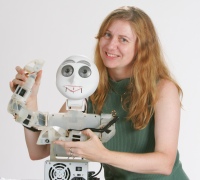. "Introducing Representations of Facial Affect in Automated Multimodal Deception Detection". In International Conference on Multimodal Interaction (ICMI), Oct 2020. (.pdf)
Automated deception detection systems can enhance health, justice, and security in society by helping humans detect deceivers in high-stakes situations across medical and legal domains, among others. Existing machine learning approaches for deception detection have not leveraged dimensional representations of facial affect: valence and arousal. This paper presents a novel analysis of the discriminative power of facial affect for automated deception detection, along with interpretable features from visual, vocal, and verbal modalities. We used a video dataset of people communicating truthfully or deceptively in real-world, high-stakes courtroom situations. We leveraged recent advances in automated emotion recognition in-the-wild by implementing a state-of-the-art deep neural network trained on the Aff-Wild database to extract continuous representations of facial valence and facial arousal from speakers. We experimented with unimodal Support Vector Machines (SVM) and SVM-based multimodal fusion methods to identify effective features, modalities, and modeling approaches for detecting deception. Unimodal models trained on facial affect achieved an AUC of 80%, and facial affect contributed towards the highest-performing multimodal approach (adaptive boosting) that achieved an AUC of 91% when tested on speakers who were not part of training sets. This approach achieved a higher AUC than existing automated machine learning approaches that used interpretable visual, vocal, and verbal features to detect deception in this dataset, but did not use facial affect. Across all videos, deceptive and truthful speakers exhibited significant differences in facial valence and facial arousal, contributing computational support to existing psychological theories on relationships between affect and deception. The demonstrated importance of facial affect in our models informs and motivates the future development of automated, affect-aware machine learning approaches for modeling and detecting deception and other social behaviors in-the-wild.
@inproceedings{Mathur-2020-1109,
author = "Leena Mathur and Maja J. Matari{\'c}",
title = "Introducing Representations of Facial Affect in Automated Multimodal Deception Detection",
booktitle = "International Conference on Multimodal Interaction",
month = "Oct",
year = "2020",
url = "http://robotics.usc.edu/publications/1109/"
}
| Name: | Leena Mathur | |
| Email: | lmathur@usc.edu | |
| Status: | current |
| Name: | Maja J. Matarić |  |
| Position: | Professor of Computer Science and Neuroscience | |
| Email: | maja@robotics.usc.edu | |
| Address: | 3650 McClintock Avenue, OHE 200 Los Angeles, CA 90089-1450 | |
| Homepage: | http://robotics.usc.edu/~maja | |
| Phone: | 213-740-4520 | |
| Fax: | 213-821-5696 | |
| Status: | current |
